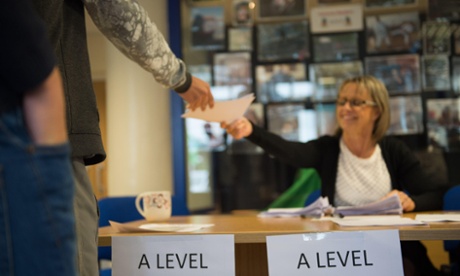
I have a cautionary tale about clearing. In fact, I am that cautionary tale. The story starts with a missed grade in my English literature A-level, continues with a rushed decision about where and what to study, and ends with me back at home six weeks later, having dropped out. I did clearing really, really badly – and my reward was a “gap year” spent filing pension applications at an insurance company. To save your students from a similar fate, here is how you can help with the process:
Ensure students are prepared
Before results day, make sure they have the right contact details listed on Ucas.com – there will be a lot of communication with universities in the next few weeks, whatever happens. And while they’re there, get them to have a look at the courses available through clearing (vacancies are published on 12 August at 6pm) in case they miss their first choice and insurance offers. I foolishly didn’t even consider the possibility of not getting my first choice, but making a list of about five alternatives is a sensible idea.
Get ready for difficult reactions
Although students will find out their grades at school, they will probably already know if they have a place at university as Ucas Track is updated in the early hours of results day. This can be tough for teachers, as Patrick Cootes, the head of sixth form at Villiers high school in Middlesex, explains: “Some students don’t want to open the envelope at all; they want to take it home and open it on their own after they’ve built themselves up to it. But of course I want them to open it right then and there so we can start talking about their options and making those phone calls.”
Be proactive about support
“It’s always a really stressful day,” Cootes continues. “There are lots of overjoyed kids jumping around like they’ve won the lottery, but there are always tears too and stony faces when they don’t get what they were hoping for.” Be on the lookout for students who are struggling and make sure they have a quiet place to sit and discuss their options, away from their classmates.
Work the phones strategically
Once a student is in clearing and has a list of vacancies to apply for, it’s time to get on the phones and contact universities. That’s phones plural, not singular – clearing hotlines will be busy and places will have been filling up from 7am. The best way to work the system is to have several people calling different universities; when one answers, hang up on the others and let the student speak to the adviser.
Prepare for the interview
Make sure students are properly prepared for these calls – they are essentially mini interviews to assess suitability, so candidates will need to be able to explain why they want to study the subject and what they can bring to the university. They will also need their Ucas number and clearing number (from Ucas Track) to hand, as well as details of their grades at A-level and GCSE. Once a verbal offer is made, they can log on to Ucas Track and update their clearing choices.
Prepare for a wait
Although a lot of clearing places will be filled quickly on results day, some students will find the process takes longer; my first choice faffed about for three days before rejecting me. This can be monumentally stressful, but encourage students to stay calm and be proactive, chasing a response and investigating other options in the meantime.
Explore longer-term possibilities
Reapplying for next year may be the best option if results are dramatically different from what was expected, or if clearing isn’t yielding anything suitable. This extra year can be a chance to get further qualifications and develop skills (or learn a lot about pensions, like I did). Emma Welsh, a teacher in London, says this approach can be hugely beneficial in the long run. “I’ve taught students before who have repeated the year, or taken an AS or additional course to build up their Ucas points,” she says. “It’s always so lovely to see that instead of getting frustrated with the situation and quitting, they persevere and earn their place, no matter if it’s slightly later than planned. They are often much more grateful for what they achieve in the long run.”
Above all, reassure
Having your future plans morph into a giant question mark on results day is horrible, as my weepy, panicky 18-year-old self would confirm. But I was alright, and your students will be too.
My impromptu gap year led to a place at a great university, on the exact course I wanted. Others take clearing places on related courses and swap as space becomes available. Some end up studying different subjects entirely, and loving them. Whatever your students choose to do, let them know it will be OK.







